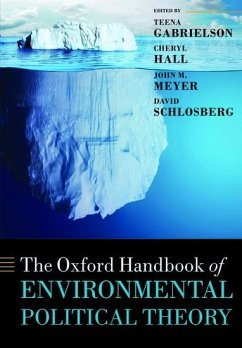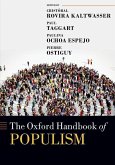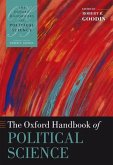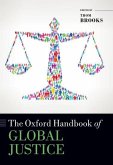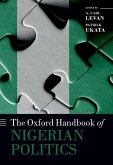Oxford Handbook of Environmental Political Theory
Herausgeber: Gabrielson, Teena; Meyer, John M; Hall, Cheryl
Schade – dieser Artikel ist leider ausverkauft. Sobald wir wissen, ob und wann der Artikel wieder verfügbar ist, informieren wir Sie an dieser Stelle.
Oxford Handbook of Environmental Political Theory
Herausgeber: Gabrielson, Teena; Meyer, John M; Hall, Cheryl
- Broschiertes Buch
- Merkliste
- Auf die Merkliste
- Bewerten Bewerten
- Teilen
- Produkt teilen
- Produkterinnerung
- Produkterinnerung
This volume defines, illustrates, and challenges the field on environmental political theory. Through a broad range of approaches, it shows how scholars have used concepts, methods, and arguments from political theory and closely related disciplines to address contemporary environmental problems.
Andere Kunden interessierten sich auch für
This volume defines, illustrates, and challenges the field on environmental political theory. Through a broad range of approaches, it shows how scholars have used concepts, methods, and arguments from political theory and closely related disciplines to address contemporary environmental problems.
Produktdetails
- Produktdetails
- Verlag: Oxford University Press (UK)
- Seitenzahl: 688
- Erscheinungstermin: 29. Mai 2019
- Englisch
- Abmessung: 248mm x 172mm x 40mm
- Gewicht: 1177g
- ISBN-13: 9780198823865
- ISBN-10: 019882386X
- Artikelnr.: 53304483
- Herstellerkennzeichnung
- Libri GmbH
- Europaallee 1
- 36244 Bad Hersfeld
- gpsr@libri.de
- Verlag: Oxford University Press (UK)
- Seitenzahl: 688
- Erscheinungstermin: 29. Mai 2019
- Englisch
- Abmessung: 248mm x 172mm x 40mm
- Gewicht: 1177g
- ISBN-13: 9780198823865
- ISBN-10: 019882386X
- Artikelnr.: 53304483
- Herstellerkennzeichnung
- Libri GmbH
- Europaallee 1
- 36244 Bad Hersfeld
- gpsr@libri.de
Teena Gabrielson is Associate Professor of Political Science and Associate Dean of the College of Arts and Sciences at the University of Wyoming. Her work on environmental citizenship, justice, and toxics discourse has been published in distinguished scholarly journals such as Environmental Politics, Theory & Event, and Citizenship Studies. Cheryl Hall is Associate Professor of political theory in the School of Interdisciplinary Global Studies at the University of South Florida. She is the author of The Trouble with Passion: Political Theory Beyond the Reign of Reason and other work exploring the roles that emotions, values, imagination, deliberation, stories, and structures play in encouraging or discouraging more just and sustainable ways of life. John M. Meyer is Professor in the Department of Politics, in Environmental Studies, and in the Environment and Community program at Humboldt State University in Arcata, California. He is the author of Engaging the Everyday: Environmental Social Criticism and the Resonance Dilemma (MIT Press, 2015), as well as other books and articles in environmental political theory. David Schlosberg is Professor of Environmental Politics in the Department of Government and International Relations, and the Director of the Sydney Environment Institute, at the University of Sydney. He is the author of Defining Environmental Justice, co-author of Sustainable Materialism and Climate Challenged Society, and co-editor of The Oxford Handbook of Climate Change and Society, all with Oxford University Press.
* I. Introduction
* 1: Teena Gabrielson, Cheryl Hall, John M. Meyer, and David
Schlosberg: Introducing Environmental Political Theory
* II. Environmental Political Theory as a Field of Inquiry
* A. Engaging Traditions of Political Thought
* 2: Harlan Wilson: EPT and the History of Western Political Theory
* 3: Farah Godrej: Culture and Difference: Non-Western Approaches to
Defining Environmental Issues
* 4: Piers H.G. Stephens: EPT and the Liberal Tradition
* 5: Peter Cannavò: EPT and Republicanism
* 6: Andrew Biro: Human Nature, Non-Human Nature, and Needs: EPT and
Critical Theory
* B. Engaging the Academy
* 7: Kimberly Smith: Environmental Political Theory, Environmental
Ethics, and Political Science: Bridging the Gap
* 8: Seaton Tarrant and Leslie Paul Thiele: Environmental Political
Theory's Contribution to Sustainability Studies
* 9: Romand Coles: EPT and Environmental Action Research Teams
* III. Rethinking Nature and Political Subjects
* A. Nature, Environment, and the Political
* 10: Steven Vogel: 'Nature' and the (Built) Environment
* 11: Justin Williams: Theorizing the Nonhuman through Spatial and
Environmental Thought
* 12: Samantha Frost: Challenging the Human x Environment Framework
* 13: David Schlosberg: Environmental Management in the Anthropocene
* B. Environment, Community, and Boundaries
* 14: Rafi Youatt: Interspecies
* 15: Catriona Sandilands: Floral Sensations: Plant Biopolitics
* 16: Simon Caney: Cosmopolitanism and the Environment
* IV. Ends, Goals, Ideals
* A. Sustainability
* 17: Ingolfur Blühdorn: Sustainability - Post-sustainability -
Unsustainability
* 18: Diana Coole: Population, Environmental Discourse, and
Sustainability
* 19: Andrew Dobson: Are There Limits to Limits?
* 20: John Barry: Beyond Orthodox Undifferentiated Economic Growth
* B. Justice, Rights, and Responsibility
* 21: Steve Vanderheiden: Environmental and Climate Justice
* 22: Kerri Woods: Environmental Human Rights
* 23: Robyn Eckersley: Responsibility for Climate Change as a
Structural Injustice
* 24: Giovanna Di Chiro: Environmental Justice and the Anthropocene
Meme
* C. Freedom, Agency, and Flourishing
* 25: Jason Lambacher: The Limits of Freedom and the Freedom of Limits
* 26: Teena Gabrielson: Bodies, Environment, and Agency
* 27: Breena Holland and Amy Linch: Cultivating Human and Non-Human
Capabilities for Mutual Flourishing
* 28: Paul Knights and John O'Neill: Consumption and Well-Being
* V. Power, Structures, and Change
* A. Identifying Structural Constraints and Possibilities
* 29: Adrian Parr: Capital, Environmental Degradation, and Economic
Externalization
* 30: Timothy Luke: Environmental Governmentality
* 31: Matthew Paterson: Political Economy of the Greening of the State
* 32: Mark Brown: Environmental Science and Politics
* 33: Elisabeth Ellis: Democracy as Constraint and Possibility for
Environmental Action
* 34: Mark Beeson: Environmental Authoritarianism and China
* 35: John Dryzek: Global Environmental Governance
* B. Theorizing Citizenship, Movements, and Action
* 36: Joan Martinez-Alier: Global Environmental Justice and the
Environmentalisms of the Poor
* 37: Kyle Whyte: Indigenous Environmental Movements and the Function
of Governance Institutions
* 38: Emily Howard and Sean Parson: Reimagining Radical
Environmentalism
* 39: Cheryl Hall: Framing and Nudging for a Greener Future
* 40: Sherilyn Macgregor: Citizenship: Radical, Feminist, and Green
* 41: Lisa Disch: Ecological Democracy and the Co-Participation of
Things
* 1: Teena Gabrielson, Cheryl Hall, John M. Meyer, and David
Schlosberg: Introducing Environmental Political Theory
* II. Environmental Political Theory as a Field of Inquiry
* A. Engaging Traditions of Political Thought
* 2: Harlan Wilson: EPT and the History of Western Political Theory
* 3: Farah Godrej: Culture and Difference: Non-Western Approaches to
Defining Environmental Issues
* 4: Piers H.G. Stephens: EPT and the Liberal Tradition
* 5: Peter Cannavò: EPT and Republicanism
* 6: Andrew Biro: Human Nature, Non-Human Nature, and Needs: EPT and
Critical Theory
* B. Engaging the Academy
* 7: Kimberly Smith: Environmental Political Theory, Environmental
Ethics, and Political Science: Bridging the Gap
* 8: Seaton Tarrant and Leslie Paul Thiele: Environmental Political
Theory's Contribution to Sustainability Studies
* 9: Romand Coles: EPT and Environmental Action Research Teams
* III. Rethinking Nature and Political Subjects
* A. Nature, Environment, and the Political
* 10: Steven Vogel: 'Nature' and the (Built) Environment
* 11: Justin Williams: Theorizing the Nonhuman through Spatial and
Environmental Thought
* 12: Samantha Frost: Challenging the Human x Environment Framework
* 13: David Schlosberg: Environmental Management in the Anthropocene
* B. Environment, Community, and Boundaries
* 14: Rafi Youatt: Interspecies
* 15: Catriona Sandilands: Floral Sensations: Plant Biopolitics
* 16: Simon Caney: Cosmopolitanism and the Environment
* IV. Ends, Goals, Ideals
* A. Sustainability
* 17: Ingolfur Blühdorn: Sustainability - Post-sustainability -
Unsustainability
* 18: Diana Coole: Population, Environmental Discourse, and
Sustainability
* 19: Andrew Dobson: Are There Limits to Limits?
* 20: John Barry: Beyond Orthodox Undifferentiated Economic Growth
* B. Justice, Rights, and Responsibility
* 21: Steve Vanderheiden: Environmental and Climate Justice
* 22: Kerri Woods: Environmental Human Rights
* 23: Robyn Eckersley: Responsibility for Climate Change as a
Structural Injustice
* 24: Giovanna Di Chiro: Environmental Justice and the Anthropocene
Meme
* C. Freedom, Agency, and Flourishing
* 25: Jason Lambacher: The Limits of Freedom and the Freedom of Limits
* 26: Teena Gabrielson: Bodies, Environment, and Agency
* 27: Breena Holland and Amy Linch: Cultivating Human and Non-Human
Capabilities for Mutual Flourishing
* 28: Paul Knights and John O'Neill: Consumption and Well-Being
* V. Power, Structures, and Change
* A. Identifying Structural Constraints and Possibilities
* 29: Adrian Parr: Capital, Environmental Degradation, and Economic
Externalization
* 30: Timothy Luke: Environmental Governmentality
* 31: Matthew Paterson: Political Economy of the Greening of the State
* 32: Mark Brown: Environmental Science and Politics
* 33: Elisabeth Ellis: Democracy as Constraint and Possibility for
Environmental Action
* 34: Mark Beeson: Environmental Authoritarianism and China
* 35: John Dryzek: Global Environmental Governance
* B. Theorizing Citizenship, Movements, and Action
* 36: Joan Martinez-Alier: Global Environmental Justice and the
Environmentalisms of the Poor
* 37: Kyle Whyte: Indigenous Environmental Movements and the Function
of Governance Institutions
* 38: Emily Howard and Sean Parson: Reimagining Radical
Environmentalism
* 39: Cheryl Hall: Framing and Nudging for a Greener Future
* 40: Sherilyn Macgregor: Citizenship: Radical, Feminist, and Green
* 41: Lisa Disch: Ecological Democracy and the Co-Participation of
Things
* I. Introduction
* 1: Teena Gabrielson, Cheryl Hall, John M. Meyer, and David
Schlosberg: Introducing Environmental Political Theory
* II. Environmental Political Theory as a Field of Inquiry
* A. Engaging Traditions of Political Thought
* 2: Harlan Wilson: EPT and the History of Western Political Theory
* 3: Farah Godrej: Culture and Difference: Non-Western Approaches to
Defining Environmental Issues
* 4: Piers H.G. Stephens: EPT and the Liberal Tradition
* 5: Peter Cannavò: EPT and Republicanism
* 6: Andrew Biro: Human Nature, Non-Human Nature, and Needs: EPT and
Critical Theory
* B. Engaging the Academy
* 7: Kimberly Smith: Environmental Political Theory, Environmental
Ethics, and Political Science: Bridging the Gap
* 8: Seaton Tarrant and Leslie Paul Thiele: Environmental Political
Theory's Contribution to Sustainability Studies
* 9: Romand Coles: EPT and Environmental Action Research Teams
* III. Rethinking Nature and Political Subjects
* A. Nature, Environment, and the Political
* 10: Steven Vogel: 'Nature' and the (Built) Environment
* 11: Justin Williams: Theorizing the Nonhuman through Spatial and
Environmental Thought
* 12: Samantha Frost: Challenging the Human x Environment Framework
* 13: David Schlosberg: Environmental Management in the Anthropocene
* B. Environment, Community, and Boundaries
* 14: Rafi Youatt: Interspecies
* 15: Catriona Sandilands: Floral Sensations: Plant Biopolitics
* 16: Simon Caney: Cosmopolitanism and the Environment
* IV. Ends, Goals, Ideals
* A. Sustainability
* 17: Ingolfur Blühdorn: Sustainability - Post-sustainability -
Unsustainability
* 18: Diana Coole: Population, Environmental Discourse, and
Sustainability
* 19: Andrew Dobson: Are There Limits to Limits?
* 20: John Barry: Beyond Orthodox Undifferentiated Economic Growth
* B. Justice, Rights, and Responsibility
* 21: Steve Vanderheiden: Environmental and Climate Justice
* 22: Kerri Woods: Environmental Human Rights
* 23: Robyn Eckersley: Responsibility for Climate Change as a
Structural Injustice
* 24: Giovanna Di Chiro: Environmental Justice and the Anthropocene
Meme
* C. Freedom, Agency, and Flourishing
* 25: Jason Lambacher: The Limits of Freedom and the Freedom of Limits
* 26: Teena Gabrielson: Bodies, Environment, and Agency
* 27: Breena Holland and Amy Linch: Cultivating Human and Non-Human
Capabilities for Mutual Flourishing
* 28: Paul Knights and John O'Neill: Consumption and Well-Being
* V. Power, Structures, and Change
* A. Identifying Structural Constraints and Possibilities
* 29: Adrian Parr: Capital, Environmental Degradation, and Economic
Externalization
* 30: Timothy Luke: Environmental Governmentality
* 31: Matthew Paterson: Political Economy of the Greening of the State
* 32: Mark Brown: Environmental Science and Politics
* 33: Elisabeth Ellis: Democracy as Constraint and Possibility for
Environmental Action
* 34: Mark Beeson: Environmental Authoritarianism and China
* 35: John Dryzek: Global Environmental Governance
* B. Theorizing Citizenship, Movements, and Action
* 36: Joan Martinez-Alier: Global Environmental Justice and the
Environmentalisms of the Poor
* 37: Kyle Whyte: Indigenous Environmental Movements and the Function
of Governance Institutions
* 38: Emily Howard and Sean Parson: Reimagining Radical
Environmentalism
* 39: Cheryl Hall: Framing and Nudging for a Greener Future
* 40: Sherilyn Macgregor: Citizenship: Radical, Feminist, and Green
* 41: Lisa Disch: Ecological Democracy and the Co-Participation of
Things
* 1: Teena Gabrielson, Cheryl Hall, John M. Meyer, and David
Schlosberg: Introducing Environmental Political Theory
* II. Environmental Political Theory as a Field of Inquiry
* A. Engaging Traditions of Political Thought
* 2: Harlan Wilson: EPT and the History of Western Political Theory
* 3: Farah Godrej: Culture and Difference: Non-Western Approaches to
Defining Environmental Issues
* 4: Piers H.G. Stephens: EPT and the Liberal Tradition
* 5: Peter Cannavò: EPT and Republicanism
* 6: Andrew Biro: Human Nature, Non-Human Nature, and Needs: EPT and
Critical Theory
* B. Engaging the Academy
* 7: Kimberly Smith: Environmental Political Theory, Environmental
Ethics, and Political Science: Bridging the Gap
* 8: Seaton Tarrant and Leslie Paul Thiele: Environmental Political
Theory's Contribution to Sustainability Studies
* 9: Romand Coles: EPT and Environmental Action Research Teams
* III. Rethinking Nature and Political Subjects
* A. Nature, Environment, and the Political
* 10: Steven Vogel: 'Nature' and the (Built) Environment
* 11: Justin Williams: Theorizing the Nonhuman through Spatial and
Environmental Thought
* 12: Samantha Frost: Challenging the Human x Environment Framework
* 13: David Schlosberg: Environmental Management in the Anthropocene
* B. Environment, Community, and Boundaries
* 14: Rafi Youatt: Interspecies
* 15: Catriona Sandilands: Floral Sensations: Plant Biopolitics
* 16: Simon Caney: Cosmopolitanism and the Environment
* IV. Ends, Goals, Ideals
* A. Sustainability
* 17: Ingolfur Blühdorn: Sustainability - Post-sustainability -
Unsustainability
* 18: Diana Coole: Population, Environmental Discourse, and
Sustainability
* 19: Andrew Dobson: Are There Limits to Limits?
* 20: John Barry: Beyond Orthodox Undifferentiated Economic Growth
* B. Justice, Rights, and Responsibility
* 21: Steve Vanderheiden: Environmental and Climate Justice
* 22: Kerri Woods: Environmental Human Rights
* 23: Robyn Eckersley: Responsibility for Climate Change as a
Structural Injustice
* 24: Giovanna Di Chiro: Environmental Justice and the Anthropocene
Meme
* C. Freedom, Agency, and Flourishing
* 25: Jason Lambacher: The Limits of Freedom and the Freedom of Limits
* 26: Teena Gabrielson: Bodies, Environment, and Agency
* 27: Breena Holland and Amy Linch: Cultivating Human and Non-Human
Capabilities for Mutual Flourishing
* 28: Paul Knights and John O'Neill: Consumption and Well-Being
* V. Power, Structures, and Change
* A. Identifying Structural Constraints and Possibilities
* 29: Adrian Parr: Capital, Environmental Degradation, and Economic
Externalization
* 30: Timothy Luke: Environmental Governmentality
* 31: Matthew Paterson: Political Economy of the Greening of the State
* 32: Mark Brown: Environmental Science and Politics
* 33: Elisabeth Ellis: Democracy as Constraint and Possibility for
Environmental Action
* 34: Mark Beeson: Environmental Authoritarianism and China
* 35: John Dryzek: Global Environmental Governance
* B. Theorizing Citizenship, Movements, and Action
* 36: Joan Martinez-Alier: Global Environmental Justice and the
Environmentalisms of the Poor
* 37: Kyle Whyte: Indigenous Environmental Movements and the Function
of Governance Institutions
* 38: Emily Howard and Sean Parson: Reimagining Radical
Environmentalism
* 39: Cheryl Hall: Framing and Nudging for a Greener Future
* 40: Sherilyn Macgregor: Citizenship: Radical, Feminist, and Green
* 41: Lisa Disch: Ecological Democracy and the Co-Participation of
Things

